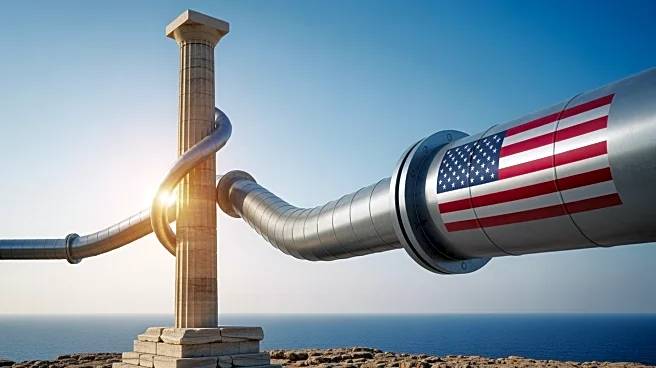What's Happening?
Greece has signed a significant 20-year agreement to import liquefied natural gas (LNG) from the United States, positioning itself as a key transit hub for U.S. LNG exports to Europe. This move is part of a broader strategy to replace Russian gas in Western
Europe, following the European Union's decision to ban Russian LNG from 2027 due to the ongoing conflict in Ukraine. The deal involves importing 700 million cubic meters of LNG annually, with potential increases to 2 billion cubic meters per year. The supply will be facilitated by a joint venture between Greece's DEPA and U.S.-based Venture Global. Greece has already tripled its gas imports since 2020 and is utilizing the Transbalkan pipeline to enhance gas transportation to Ukraine and other European countries.
Why It's Important?
This agreement is crucial for reshaping the energy landscape in Europe, reducing dependency on Russian gas, and enhancing energy security. By becoming a transit hub for U.S. LNG, Greece is strategically positioned to influence energy distribution in Northern Europe, including Ukraine. The deal supports the EU's efforts to diversify energy sources and mitigate geopolitical risks associated with Russian energy supplies. U.S. Energy Secretary Chris Wright emphasized Greece's new role as a launch point for American energy trade into Europe, highlighting the geopolitical and economic significance of this development.
What's Next?
The joint letter signed by gas grid operators from Greece, Bulgaria, Romania, Moldova, and Ukraine seeks regulatory approval to increase transportation capacities through the Transbalkan pipeline until April 2026. This expansion is expected to facilitate greater LNG flow from Greece to Ukraine, further solidifying Greece's role in the European energy market. The ongoing shift in energy supply dynamics may prompt further infrastructure investments and policy adjustments across Europe to accommodate increased LNG imports.
Beyond the Headlines
The long-term implications of this deal could include a shift in energy alliances and increased competition among LNG suppliers. As Greece strengthens its position as a transit hub, it may attract additional investments in energy infrastructure, potentially leading to economic growth and job creation. The deal also underscores the importance of energy diversification in mitigating geopolitical tensions and ensuring stable energy supplies.
















